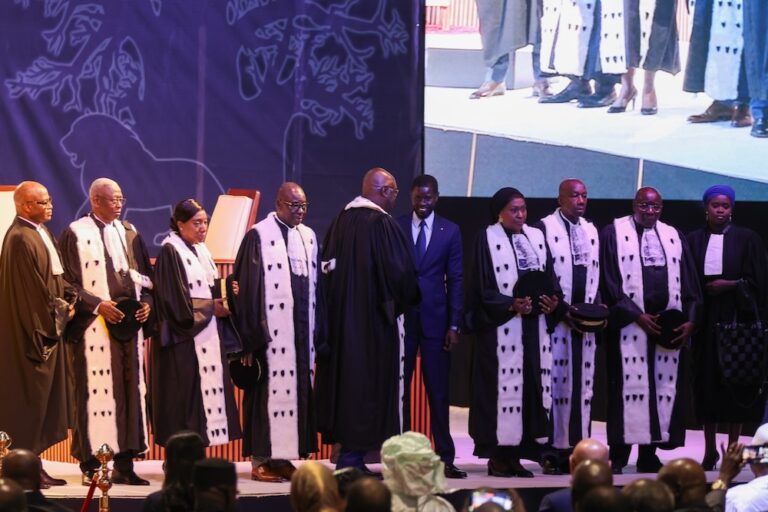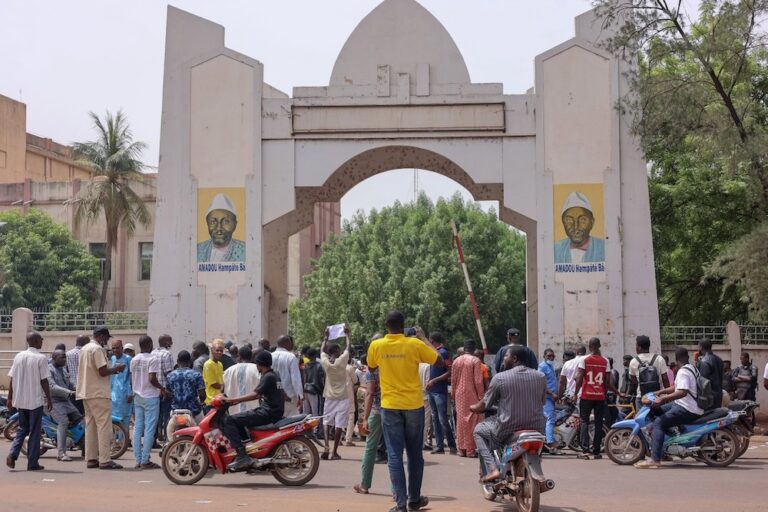September 2022 in Africa: A free expression roundup produced by IFEX’s regional editor Reyhana Masters, based on IFEX member reports and news from the region.
The journey to the Forum on Internet Freedom in Africa 2022 (FiFAfrica2022) began even before stakeholders, panellists and participants met in Lusaka, Zambia in September. The event, hosted by Collaboration on International ICT Policy for East and Southern Africa (CIPESA) in partnership with Zambia’s Ministry of Technology, saw a return to an in-person conference, after a 2-year hiatus due to COVID-19.
Momentum for the annual event, which brings together policymakers, government officials, civil society, media, media freedom advocates, freedom of expression and access to information activists, tech companies and technologists in Africa, was kickstarted by Ugandan digital security expert Andrew Gole.
Gole combined his passion for motor bikes with his commitment to digital security to raise awareness around his work and #FiFAfrica2022 by biking to Zambia through Rwanda, Tanzania and Malawi. “I work at the nexus of technology and digital safety with numerous grassroot communities outside Kampala which are hard to get to, so I usually get around on my bike and that got me thinking about travelling to Lusaka the same way. I wanted to make a statement about the importance of digital security and interact with the communities I would meet along the way,” he explained.
The excitement continued as Ourveena Gerveesha Topsy Sonoo, the Special Rapporteur on Freedom of Expression and Access to Information for the African Commission on Human and Peoples Rights (ACHPR), officiated at the opening, which fittingly coincided with the marking of the International Day for Universal Access to Information (IDUAI). Speakers working on advancing the free flow of information brought their insights and approaches to addressing practice and policy gaps affecting the realization of access to information in Africa.
The momentum continued to build, as organisations showcased new initiatives such as the Namibian Digital Rights Declaration presented by Namibia’s Institute of Public Policy Research during a session on Mainstreaming Human Rights in Cybercrime Law and Policy Making.
Global Digital Partners demonstrated their “updated and reviewed LEXOTA platform, which tracks disinformation laws, policies, and patterns in sub Saharan Africa, to better serve CSOs and groups that fight disinformation.”
During their presentation on Making Social Media Companies Listen! Meta Oversight board members Afia Asantewaa Asare Kyei and Abigail Mpabwa Bridgman spoke about the importance of the cultural context for content moderation on topics from the African continent.
Advox, the digital rights project of Global Voices, warned in their presentation that “a decrease in press freedom is usually a major predictor of the rise of digital authoritarianism,” especially because it creates a tolerance for legislative abuse.
The jam-packed four day event concluded with the launch of CIPESA’s new State of Internet Freedom report: The Rise of Biometric Surveillance, focusing on biometric data collection programmes related to civil registrations – such as the issuance of national identity cards, biometric voter registration and identification programmes, government-led CCTV programmes with facial recognition capabilities, national e-passport initiatives, refugees’ registration, and mandatory biometric SIM card registration.
Africa marks 2nd International Day for Universal Access to Information
As the continent which drove the advocacy campaign to have 28 September recognised as the International Day for Universal Access to Information, Africa celebrated it with events and reflections focusing on this year’s theme – “Artificial Intelligence, e-Governance and Access to Information”.
In its #IDUAI regional message, the Media Foundation for West Africa (MFWA) pointed out that “the absence of proper information-keeping and processing infrastructure has emerged as one of the major setbacks in the access to information landscape in the region.” MFWA also launched the first in a series of explainers around about Access to Information laws in West Africa.
In recognition of its sustained work advocating for the right to information, Ghana’s Right to Information Commission honoured MFWA : “You seek to protect, consolidate, and expand the fundamental freedom of expression of all persons. In doing this, you make the world a better place,” read part of the citation.
IFEX member the Media Institute of Southern Africa (MISA) urged African governments to adopt a human-rights-based approach to developing AI policies that promote access to information and improved e-Governance, instead of seeing AI “as a means to snoop on citizens’ communication, undermine the right to privacy and frustrate access to information.”
Speaking at a Global Conference on Universal Access to Information held in Tashkent, Uzbekistan, Gilbert Sendugwa, executive director of IFEX member the Africa Freedom of Information Centre (AFIC), promoted understanding of the African context as he focused on ways to ensure participation and accountability in the digital era.
Sports journalists under attack
In September, two separate incidents in two different countries illustrate a worrying trend: media professionals specialising in sport are coming under fire. In Uganda, photographer Johnson Were was tackled by a rugby player/coach for recording an off-pitch scuffle during a rugby sevens tournament. Then a group of rogue supporters of one of Ghana’s popular soccer clubs, Kumasi Kotoko FC, sent a death threat to six journalists for negative coverage of the team. The six journalists are Obeng Kweku Andy, Benedict Kwadwo Mensah, Nuhu Adams, Owusu Bempah, Rockson Adjei Yeboah, and Richmond Opoku.
During the course of 2022, other attacks on sports journalists have been recorded.
After a tense soccer match in June, Nigerian sports reporter Tobi Adepoju was assaulted by fans of Shooting Stars FC, only to be saved by police officers who fired into the air to disperse the crowd. A month earlier, Cameroon journalist Eyong Macdella Bessong was sexually assaulted and insulted at a football match, after stadium officials refused to recognise her electronic media accreditation, accusing her of being a sex worker. In the former case, the club was fined and made to compensate the journalist.
In brief
The worrying attacks on broadcasters in Africa continues, with faith-based radio station Radio Evangélique Butembo-Oicha, in Democratic Republic of Congo’s restive province of North Kivu, raided by armed men who stole equipment and assaulted a technician. Dozens of radio stations in Nigeria and Malawi were shut down or face closure on the orders of the respective broadcasting regulatory bodies. During a meeting with the Parliamentary Committee on Media, Information and Communications, MISA-Malawi raised the cancellation of broadcasting licences by the Malawi Communications Regulatory Authority (MACRA).
On 8 September, Uganda’s parliament passed the Computer Misuse (Amendment) Bill 2022, which CIPESA describes “as a regressive law on the misuse of social media and hate speech.” Uganda’s Human Rights Network for Journalists has written to President Yoweri Museveni asking him not to sign the Bill into law.
Nigerian journalist Olamilekan Hammed, who was arrested in April of this year, remains behind bars because of the hefty bail conditions set by the Ogun state High Court.
Guinea’s regulator – the High Authority for Communication (HAC) – suspended N’Faly Guilavogui, the deputy director of media Groupe Evasion Guinea, for 10 days in September. His temporary ban was supposedly imposed for violating “the ethics and professional conduct, as well as the code of good conduct of Guinean journalists for broadcasting an excerpt of a statement released by the National Association of the Youth of Konia.”
In what PEN International has described as a travesty of justice, Zimbabwean award-winning author and filmmaker Tsitsi Dangarembga and fellow protester Julie Barnes were convicted of inciting public violence for participating in a peaceful 2020 protest.
The Media Alliance of Zimbabwe, which includes the Zimbabwe chapter of the Media Institute of Southern Africa, an IFEX member, has raised concerns over the government’s purchase and use of a telecommunications traffic monitoring system, which they point out has potential to expose citizens to state surveillance.
Following the arrest and conviction of Lawrence Muchinda on charges of defaming President Haikande Hichelema in a TikTok video, Zambian police spokesperson Rae Hamoonga said: “The Zambia Police Service would like to warn persons who are in the habit of committing criminal offences on the cyber space that gone are the days that they can commit offences and expect not to be traced and arrested.”
DRC journalist Tatiana Osango was sexually assaulted outside the headquarters of opposition party Ecidé, by party supporters armed with stones and machetes. The assailants attacked her along with her driver, and threatened to rape and kill her. She was robbed of her belongings and US$700 during the attack. Muthoki Mumo, CPJ’s sub-Saharan Africa representative in Nairobi, said: “Attempts to silence the press – whether through gendered attacks or police violence – send a chilling message that journalists are not safe to work in the DRC.”
An Ethiopian court has granted police their request to continue holding Gobeze Sisay, editor and founder of YouTube-based The Voice of Amhara, and Meaza Mohammed, the founder and chief editor of YouTube-based Roha TV, in custody. Both journalists were previously arrested in connection to their work.



